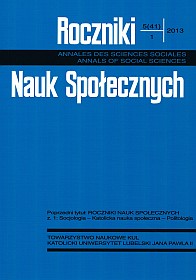The Universal Nature of the Relationship Between the Noble Local Government and the State in the Polish-Lithuanian Commonwealth
Abstract
This article aims to contribute to the growth of reflection in the area of theory of local governance and the research on the practices of the local governments in the era of the Polish- Lithuanian Commonwealth. The issue at hand has been analysed from two research perspectives. Under one view – naturalistic – the local government is seen as a social phenomenon and as an institution whose primary function is to represent the society. Under the other – state-related approach – the local government is a construction rooted in the state’s legal doctrine. The article uses a historical outlook to discuss the evolution of the aristocratic governmental institutions. At the same time, when the theoretical and praxeological perspective is adopted, the role of the local government in the structure of the state is discussed, with its diversified attitudes towards the identification of sources for development of the government with its dynamics, and helps observe decentralization processes taking place. The issues scrutinized in the article have been approached from the historical, sociological, political and systemic perspectives. The author takes into account the changes taking place in local government and in the state-level government of the Polish-Lithuanian Commonwealth. The narrative of the article employs the problem-oriented, chronological method. Temporal divides introduced in the article are justified by the series of systemic, legal, social, economic and cultural changes, which significantly influenced the rise, functioning and the demise of the institution under analysis.
Copyright (c) 2013 Roczniki Nauk Społecznych

This work is licensed under a Creative Commons Attribution-NonCommercial-NoDerivatives 4.0 International License.


